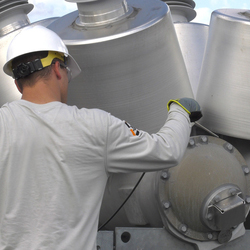Sulfur hexafluoride (SF₆) is a potent greenhouse gas widely used in the electrical industry for its excellent insulating properties. However, due to its high global warming potential, regulatory bodies have implemented stringent reporting requirements to monitor and reduce SF₆ emissions. In California, the California Air Resources Board (CARB) oversees these regulations, which are distinct from federal requirements set by the Environmental Protection Agency (EPA).
This guide aims to clarify CARB's SF₆ reporting obligations, differentiate them from federal mandates, and provide actionable steps for compliance.

What is CARB Reporting?
The California Air Resources Board (CARB) is the state's primary agency for air quality and climate change programs. CARB's SF₆ reporting focuses on tracking and reducing emissions from gas-insulated equipment (GIE) and other non-electric, non-semiconductor sources. The regulations require entities to report SF₆ usage, emissions, and inventory to ensure transparency and accountability in greenhouse gas emissions.
Who Needs to Report to CARB?
The California Air Resources Board (CARB) requires specific categories of entities to report their use and emissions of sulfur hexafluoride (SF₆) due to the gas's extremely high global warming potential. One key group includes distributors, companies that sell SF₆ within the state of California. These businesses must keep detailed records of all SF₆ sales and submit an annual report to CARB by March 30 of the following year.
The report should include the quantity of SF₆ sold, any returned or destroyed amounts, and relevant customer information when applicable. This data enables CARB to monitor the volume of SF₆ entering the state and aids in enforcing emission control measures.
Another group subject to reporting is operators of gas-insulated equipment (GIE), such as utilities or facilities using SF₆-insulated switchgear or circuit breakers. These entities must submit annual emissions reports by June 1, covering the previous calendar year. They are required to maintain detailed records of equipment inventory, SF₆ emissions, and maintenance activities that could result in gas loss. This includes tracking leaks, servicing procedures, and any gas recovery efforts. Accurate reporting at the equipment level is critical to ensuring compliance and minimizing environmental impact.
Even organizations that have received exemptions for using SF₆ for specific purposes, such as in research, military, or medical settings, are not entirely exempt from reporting. These entities must still follow the terms outlined in their CARB-issued exemption letters. They are required to submit reports detailing how SF₆ was used and whether any emissions occurred. Failure to comply with the conditions of an exemption can lead to revocation of that status and enforcement action from CARB.
Federal vs. State Requirements: A Comparison
While both the Environmental Protection Agency (EPA) and CARB regulate SF₆ emissions, their frameworks differ significantly in scope and stringency. At the federal level, the EPA enforces SF₆ reporting through the Greenhouse Gas Reporting Program (GHGRP). Under this program, facilities must report their emissions only if they meet or exceed a threshold of 25,000 metric tons of CO₂ equivalent per year. This approach focuses primarily on large-scale emitters, such as power plants and industrial manufacturing operations.
In contrast, CARB’s regulations are far more comprehensive. There is no minimum emissions threshold; any entity that uses or possesses SF₆ in California must report their activity, regardless of the volume involved. CARB requires granular data, including the specific amounts of SF₆ used or emitted and detailed equipment inventories. These requirements are part of California’s broader climate strategy to aggressively reduce high-GWP gases and transition to cleaner alternatives.
For companies operating within California, this means that compliance with EPA regulations alone is not sufficient. They must also meet the more rigorous CARB standards, which demand greater transparency and a higher level of detail. Understanding and adhering to both sets of rules is essential to avoid regulatory penalties and ensure continued operations within the state.
CARB SF₆ Reporting Requirements
CARB outlines strict annual reporting requirements to ensure that SF₆ emissions are tracked and mitigated effectively. Reporting deadlines vary depending on the type of entity. Distributors must submit their reports by March 30 each year, documenting SF₆ sales from the previous calendar year. Operators of gas-insulated equipment, on the other hand, are required to report by June 1. These deadlines help CARB maintain a consistent reporting schedule and ensure timely data collection.
The content of these reports must be comprehensive. Entities are expected to provide the total quantity of SF₆ purchased, used, and emitted over the reporting period. Reports must also include a detailed inventory of all SF₆-containing equipment, complete with serial numbers, equipment type, location, and the amount of SF₆ in each unit.
Additionally, any activities related to the recycling, reclaiming, or destruction of SF₆ must be thoroughly documented, along with information on contractors or vendors involved in these processes.
All reports must be submitted electronically using CARB’s approved forms and formats. The reporting spreadsheets and submission instructions are available on the official CARB SF6 Reporting page. Entities must ensure that their submissions are accurate and complete. Incorrect or incomplete data, or submission through unofficial channels may result in a violation of the reporting requirements.
Consequences of Non-Compliance
Failure to comply with CARB’s SF₆ reporting requirements can have serious consequences for organizations. One of the most immediate risks is the imposition of monetary penalties. CARB has the authority to fine companies for late submissions, missing data, or inaccurate information. The amount of the penalty can increase depending on the length and severity of the non-compliance.
Beyond financial penalties, there is also the potential for legal action. Deliberate misreporting or a complete failure to submit required information could lead to civil or criminal proceedings. In cases involving exemptions, CARB may revoke previously granted exemptions or suspend operations until compliance is achieved.
Non-compliance can also significantly damage a company’s reputation. CARB may publicly disclose violations, especially in cases of repeated offenses. This public disclosure can undermine a company’s credibility, particularly for those working with government agencies, environmentally conscious stakeholders, or green-certified clients. Maintaining compliance is not only a regulatory obligation but also a critical component of responsible environmental stewardship and corporate accountability.
Resources for CARB SF₆ Reporting
Organizations seeking to comply with CARB’s SF₆ reporting requirements can access a variety of helpful resources. The California Air Resources Board provides detailed guidance, forms, and instructions on its official website, including templates for reporting SF₆ sales, usage, and emissions. These documents outline the information required for each type of entity, whether you're a distributor or a gas-insulated equipment (GIE) operator and help ensure submissions meet all regulatory standards.
Additionally, the U.S. Environmental Protection Agency (EPA) publishes regulatory updates on SF₆ and other insulating gases, which are valuable for understanding how federal rules align or differ from California’s more stringent mandates. The 2025 US EPA Regulatory Update for SF6 offers insight into upcoming changes and how they might impact reporting responsibilities. Reviewing both CARB and EPA guidelines can help organizations ensure full compliance and stay ahead of potential regulatory shifts.
Conclusion and Action Steps
To stay compliant with CARB’s SF₆ reporting requirements, organizations must take a proactive and structured approach. The first step is to determine whether your company falls within CARB’s jurisdiction, either as an SF₆ distributor, a GIE operator, or an exempted user. Understanding your classification will clarify what specific reporting obligations apply.
Once applicability is confirmed, it’s essential to gather accurate and comprehensive data. This includes detailed records of SF₆ purchases, emissions, and equipment inventories. Establishing robust internal tracking processes can simplify this task and reduce the risk of reporting errors.
Meeting reporting deadlines is also critical. Distributors must submit their annual reports by March 30, while GIE operators have until June 1 to report data for the previous calendar year. Missing these deadlines can result in fines, legal consequences, or reputational harm.
Finally, organizations should stay informed about changes in CARB and EPA regulations. Regulatory requirements can evolve, and ongoing compliance depends on staying current with updates and adjusting internal processes as needed.
Need Help Navigating SF₆ Reporting?
CARB reporting and emissions compliance can be overwhelming—but you don’t have to manage it alone. As the exclusive service provider for DILO Company, Inc., In-Gas Direct is uniquely positioned to support your SF₆ gas reporting needs with unmatched technical expertise and direct access to DILO-certified tools and training. Whether you're a utility, gas distributor, or exempted user, their team specializes in SF₆ gas management, emissions tracking, and compliance with evolving state and federal regulations.
From accurate recordkeeping and CARB submittals to turnkey reporting packages, In-Gas Direct delivers the trusted support you need to stay compliant and avoid costly penalties. With decades of industry experience and a commitment to zero emissions, they make it easier than ever to meet your environmental obligations without disrupting operations.
Contact In-Gas Direct today to schedule a consultation or learn more about our comprehensive gas handling and compliance solutions.
Don’t be a Gashole—stay ahead of regulations with In-Gas Direct.




